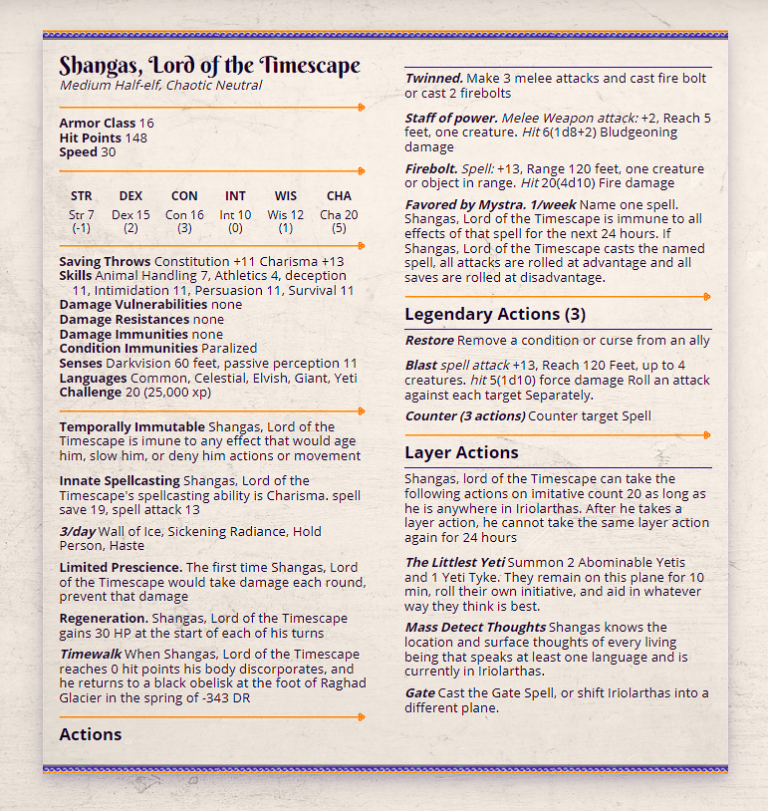Give Wish to your low-level party
A scroll of Wish is a great item to give low-level parties—OK now hear me out. Yes, a clever party can use wish to unbalance the game or reshape the world. However, if you roll with the punches, it will improve your sandbox over-all. I think more DMs should be using this tool. so, I’ve listed some reasons why the spell is great and some advice on how to mitigate the scary parts.
Why let players cast Wish?
The single most important reason to cast Wish is that it’s fun. If you are playing Dungeons and Dragons, it’s fair to assume your players want to feel powerful, cast iconic spells and have an impact on the fictional universe. You never know when your game is going to end. If you try to make your characters earn their cool moments, they might spend hours slogging through a boring campaign only to have it fall apart before they ever do anything fun.
Wish lets the party shape the world to suit their needs. Don’t be intimidated by giving your players control of the setting. It’s a great way to keep them engaged. Collaboration increases investment and leads to ideas you wouldn’t have thought of on your own. Besides, you are still the DM. Even though it feels like the players could exploit a wish, you have a lot of power to reign in their crazier ideas. Players are predictable. They only ever wish for one of three things. With a little bit of preparation, you can give your party an epic moment that will leave a lasting mark on the world and still easily manage any potential side effects.
When not to use Wish
Although I think Wish is a powerful tool, it’s not for every campaign or all players. It generally works better for open-ended campaigns. linear games with a strong narrative focus are easier to disrupt and potentially harder to get back on track. I talk about game derailment some in the “shortcut the plot” section, but the effect is worse for a linear style of play. The BBEG destroying the world with an act three sky laser could back players into a corner. Of course, they want to experience your epic plot. However, it’s going to be hard for the characters to justify why they aren’t using Wish to save the world in universe.
In addition to the plot, you should also think about the personalities around the table. Pulling off a big moment like this takes some level of trust and communication. Whoever uses the Wish spell is going to have a lot of influence over the rest of the game. There might be hurt feelings if some players benefit more than others. Before you include the wish spell honestly consider how your players might react to it. Players who don’t know each other well might not have the same level of trust in one another as old friends. If you have two personalities that already clash, they might use this as an excuse to blow up the game. If the thought of your players arguing over wish stresses you out, then it’s not worth it.
What do players Wish for?
I’ve successfully deployed wish in 7 or 8 low-level campaigns at this point. Except for one truly original scheme, players have always done one of three things. Admittedly, two of the three scenarios can be awkward for the DM. However, the situation is never as bad as it feels in the moment. There are always easy ways to work around whatever short-term concerns you might have. Plus, the potential benefits extend long into the future.
Shortcut the plot
OK so this one doesn’t come up as often as you think, but it does happen. You give a quest to your players and they immediately Wish for the McGuffin. Now you don’t have anything to do for the rest of the session, maybe several sessions. That’s genuinely a feel-bad moment. Nobody likes to waste game prep. However, players don’t need to use a 9th level spell to derail the plot. You probably already have experience with players taking a left turn and improvising until the story is back on track. Don’t fight too hard to keep the players on the rails. If they are spending resources to get around your story, it’s probably time to wrap up this arc and move on to something new.
If you are still struggling, a good approach here is to be honest with your players. Tell them you are impressed with how quickly they solved that situation. Let them know you don’t have anything else prepared. Then ask if there is anything they would rather be doing. They might just need some downtime to decompress. Or maybe one of them suggests a more interesting plot hook. It’s also helpful to keep a short, generic adventure in your back pocket specifically for these instances. Something you can deploy in an unexpected moment just to keep your players busy while you patch together your next big arc. If you don’t have time to write your own side quest, there are lots of prewritten modules designed with this scenario in mind.
Ultimate power!
This one is a catch-all for anything that could unbalance the game. Wishing for a crazy amount of money, or the powerful magic item, or, like, a flying castle with laser turrets or something. Again, this has the potential to feel bad from the DM perspective. Wishing for the McGuffin can ruin one story arc. A flying castle can ruin many arcs. That said If the players agree they want something, strongly consider giving it to them. The party is asking for a new campaign theme. Do players want an infinite amount of money? Let them play Bruce Wane. A hyper OP katana? Give them a ninja army to slice through. Flying castle? Great! The campaign is now about the geopolitics of a stateless, roaming sky-city. Sometimes it’s OK to give people exactly what they want.
If you are still worried that your players’ bonkers request is going to destroy the entire game, the text of the Wish spell can help us out. Anything other than replicating an 8th level spell or lower is up to DM discretion. Just like before, the best approach is clear communication with your players. Explain why their wish is outside the scope of the campaign, then suggest a similar effect you feel is more manageable. Alternatively, you could ask players to stick to the example Wishes included in the spell. All the examples are well thought out. Even though they feel powerful, they are not likely to completely break your game.
Get out of jail free
OK, so this is the real reason I give out Wish to my low-level parties. As a DM I love giving my players impossible feeling scenarios and celebrating with them as they come up with creative solutions. The problem is that (especially at low levels) sometimes the line between “feels impossible” and “is impossible” can get blurry. Maybe you’ve overturned an encounter, or your players have misjudged a situation and gotten in over their heads. Maybe the plan was perfect, but the dice were just against you. Even though PCs in 5e are comparatively tough; a hard fight or a tense social encounter can still go sideways quickly.
At higher levels, players have the tools and experience to get themselves out of bad situations. At lower levels, players have fewer options to get themselves out of a death spiral. Making sure that players have access to a wish between levels 1-5 helps me to feel comfortable giving my party interesting and challenging encounters. No matter what happens I will always rule to let wish undue the problem. The players will feel like it was their good idea that saved the day and not like I was cheating to keep them alive.
Conclusion
OK so I think that’s it. I genuinely believe that Wish will make your low-level sandbox campaign more interesting for you and your players. I hope I’ve convinced you that it’s not as scary as it might seem at first. It’s ok to give your players a little bit of power over the setting sometimes. Players want to feel like they can make a mark on the world and as a DM you still have a lot of power to control the game from behind the scenes.


